Key takeaways:
- RPGs enhance critical thinking, emotional engagement, and teamwork, fostering personal growth and collaboration among players.
- They serve as effective educational tools, promoting empathy, communication skills, and active participation in learning contexts.
- Implementing RPGs in the classroom requires a supportive environment, clear expectations, and reflection activities to deepen learning experiences.
- Challenges include managing diverse personalities and balancing gameplay with educational objectives, necessitating facilitation and awareness from educators.
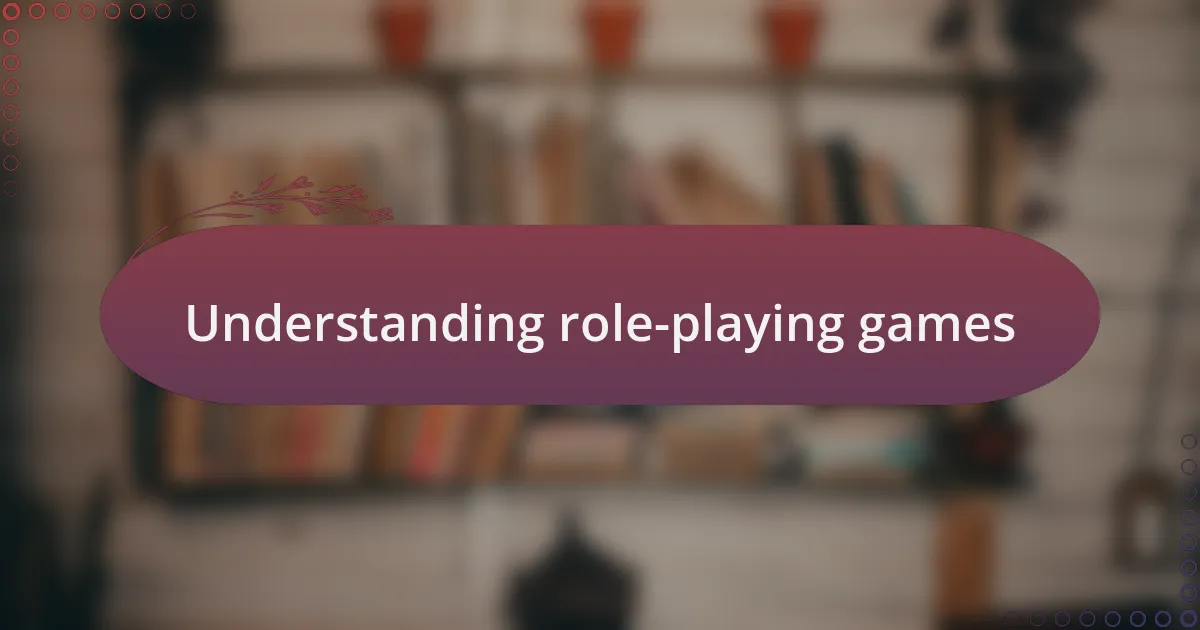
Understanding role-playing games
When I first encountered role-playing games (RPGs), I was captivated by how they blend storytelling with player agency. Each player steps into a character’s shoes, exploring not just a fantasy world but also their own personal growth. Has a game ever made you reflect on your own decisions? I know I have found myself reconsidering my choices after a particularly challenging in-game scenario.
One of the most fascinating aspects of RPGs is the intricate dynamics of collaboration. Players must work together to overcome obstacles, which fosters teamwork and communication skills. I remember one session where our group faced an insurmountable challenge, and it was the brainstorming and support from my peers that ultimately led us to victory. How many classroom experiences can truly mirror such teamwork through creative problem-solving?
Moreover, RPGs encourage deep emotional engagement. As I navigated through my character’s struggles and triumphs, I found myself reflecting on my own life’s struggles. I often wonder, how does immersing yourself in someone else’s story help you to better understand your own? For me, RPGs have become a powerful tool not just for entertainment but also for introspection and personal development.
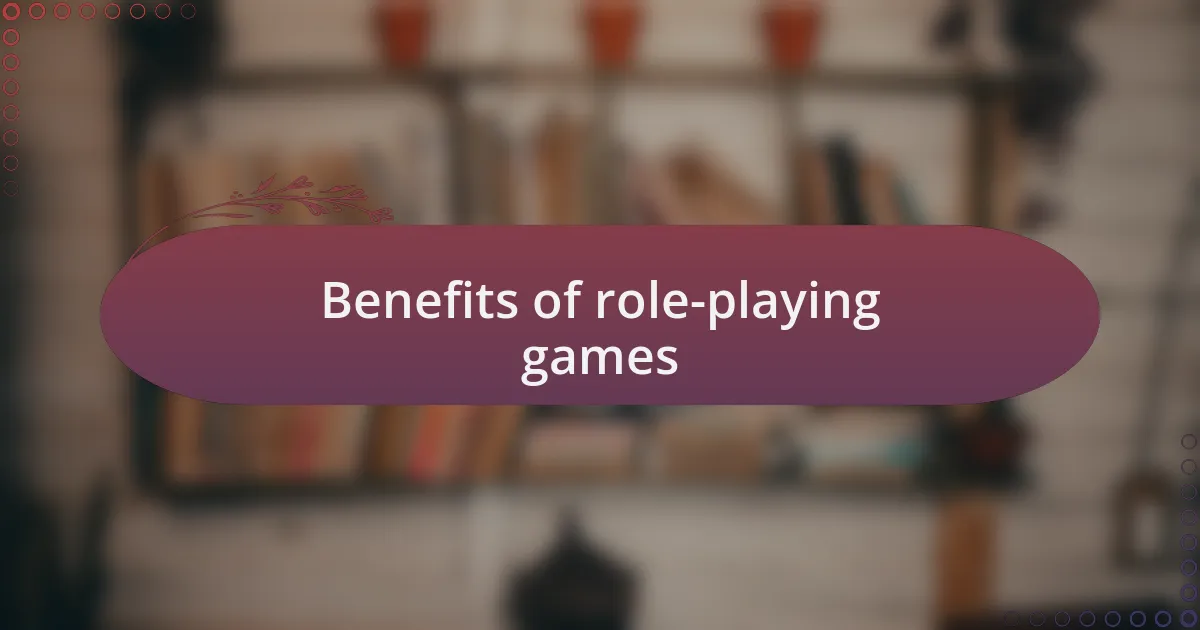
Benefits of role-playing games
One major benefit of role-playing games is their ability to enhance critical thinking and decision-making skills. I recall a session in which we faced a moral dilemma—do we save the town or pursue the villain? This prompted deep discussions and forced us to weigh the consequences of our choices. I found myself contemplating how this challenge paralleled real-life decisions, making me more mindful in everyday situations. Have you ever had to make a tough call in a group?
Additionally, RPGs often serve as a platform for creativity and self-expression. When I created my character, it was more than just altering stats; it was about crafting a persona with history, aspirations, and flaws. I remember feeling empowered as I navigated the storyline, and it pushed me to think outside the box. Does channeling your creativity through a character help you express parts of yourself that you might not in real life?
Lastly, the social connections formed during RPG sessions are invaluable. I made lasting friendships simply by sharing laughs and setbacks around the gaming table. These interactions strengthened our bonds, creating a shared experience that I still cherish today. Have you experienced the surprise of connecting with someone through a shared adventure? In my experience, these relationships often extend beyond the game, fostering a sense of community and belonging.
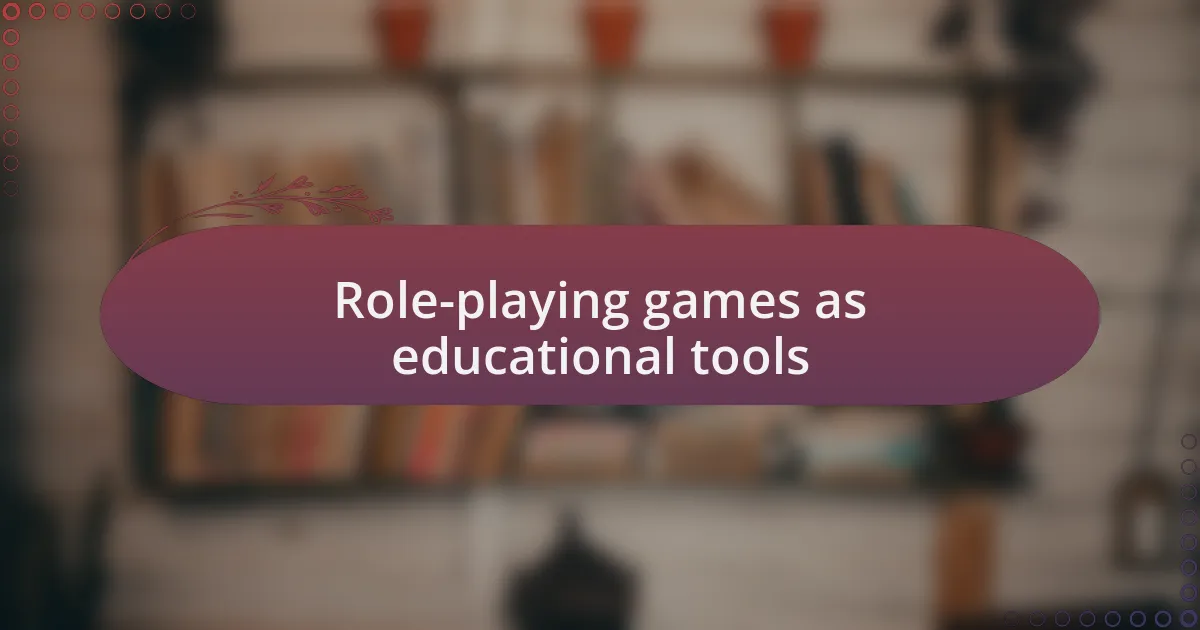
Role-playing games as educational tools
Role-playing games offer a unique opportunity to cultivate empathy within a safe environment. During one session, I portrayed a character who came from an entirely different background than my own. I found myself stepping into their shoes, experiencing their struggles and motivations. This exercise not only expanded my understanding of diverse perspectives, but it also led me to reflect on my own biases. Have you ever had a moment in a game that made you think differently about a real-world issue?
Moreover, the collaborative nature of RPGs fosters teamwork and communication skills. In one campaign, our group faced a formidable challenge that required careful coordination. I vividly remember brainstorming with friends, each of us contributing ideas and strategies. This process not only sharpened my ability to articulate my thoughts but also taught me the value of listening to others. Do you recall a time when working together towards a common goal made a significant difference in your experience?
Lastly, RPGs can serve as effective assessment tools in an educational context. For instance, when a teacher integrated a role-playing scenario into a history lesson, it transformed the way we engaged with the material. Instead of passively absorbing information, we became active participants in a historical dialogue, which I found far more enjoyable and insightful. Have you experienced a lesson that challenged you to embody what you learned in an impactful way?
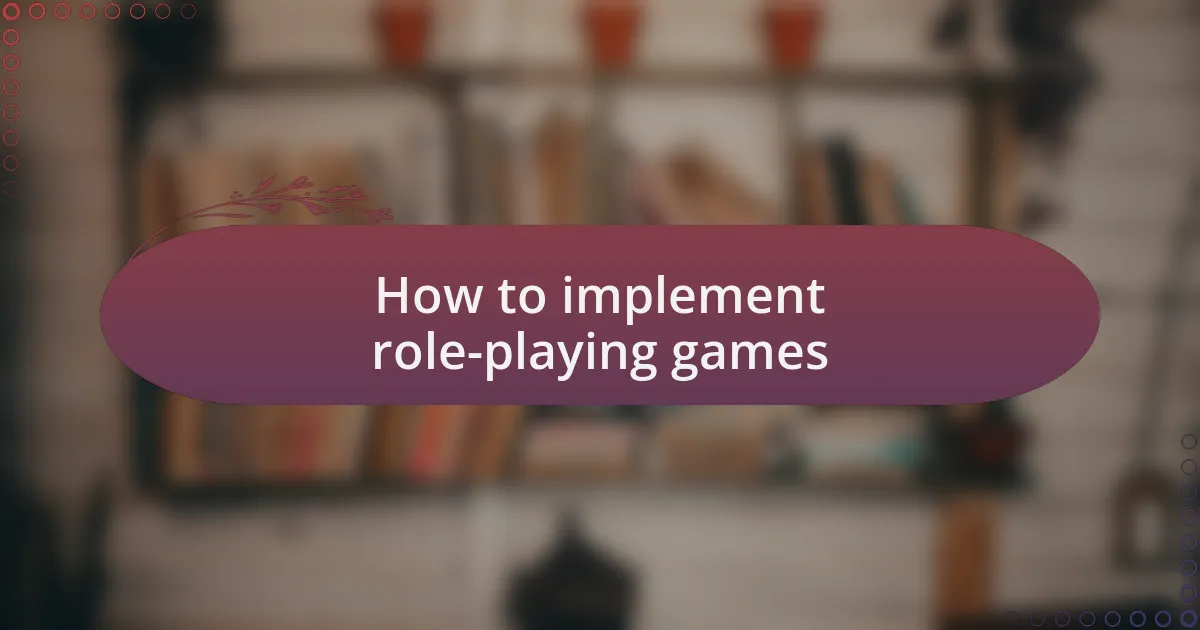
How to implement role-playing games
To implement role-playing games effectively in the classroom, start by aligning them with your learning objectives. For instance, I remember a teacher who introduced a role-playing exercise during our science class about ecosystems. By adopting the roles of various animals, I began to genuinely grasp the delicate balance of nature, suddenly seeing the environment from a new angle. What better way to internalize complex concepts than by literally acting them out?
Next, create a structured environment where students feel safe to express themselves. I once participated in a role-playing game where the teacher encouraged us to explore different ethical dilemmas. I was surprised at how comfortable I felt discussing sensitive topics with classmates I hadn’t connected with before. How can a thoughtfully crafted setting enhance the willingness to engage in difficult conversations?
Lastly, consider incorporating reflection activities post-role-play. I had a teacher who always set aside time for us to discuss our experiences after each session. This not only allowed us to consolidate our thoughts but also to recognize any emotional shifts we had undergone during the game. Isn’t it fascinating how articulating our feelings can deepen the learning experience?
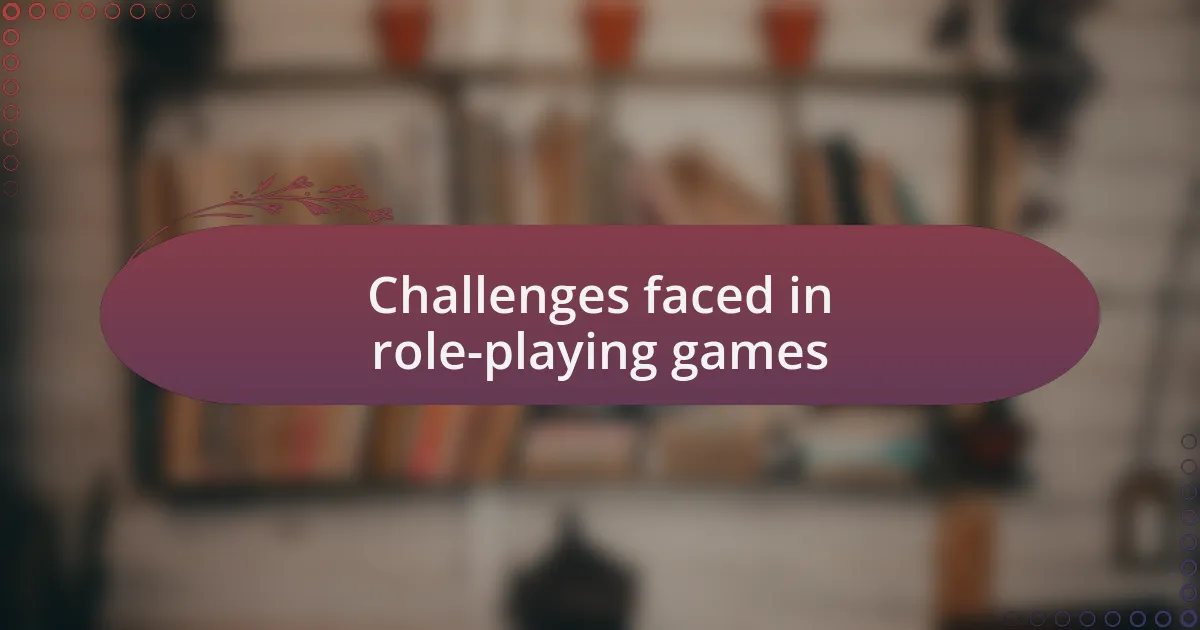
Challenges faced in role-playing games
When diving into role-playing games, one of the challenges I often encountered was resistance from students who felt uncomfortable stepping out of their familiar roles. In one instance, I saw a student initially hesitant to participate because they feared judgment from peers. It made me realize how crucial it is to cultivate a supportive classroom environment that encourages vulnerability. How can we help students overcome their apprehensions and embrace new experiences?
Another significant hurdle is the balance between gameplay and educational objectives. There were moments where I got so wrapped up in the fun of the role-play that I lost sight of the lesson at hand. It took reflection and feedback to understand the importance of maintaining focus on our learning goals. Have you ever found yourself caught in the excitement, forgetting the purpose behind the activity?
Additionally, managing diverse personalities during role-playing can be quite a task. I remember a scenario where a dominant student overshadowed quieter classmates, stifling their contributions. This experience highlighted the necessity of facilitating discussions and ensuring every voice is heard, which can sometimes feel overwhelming for educators. How do we create equitable opportunities for all students to share their perspectives in such a dynamic setting?
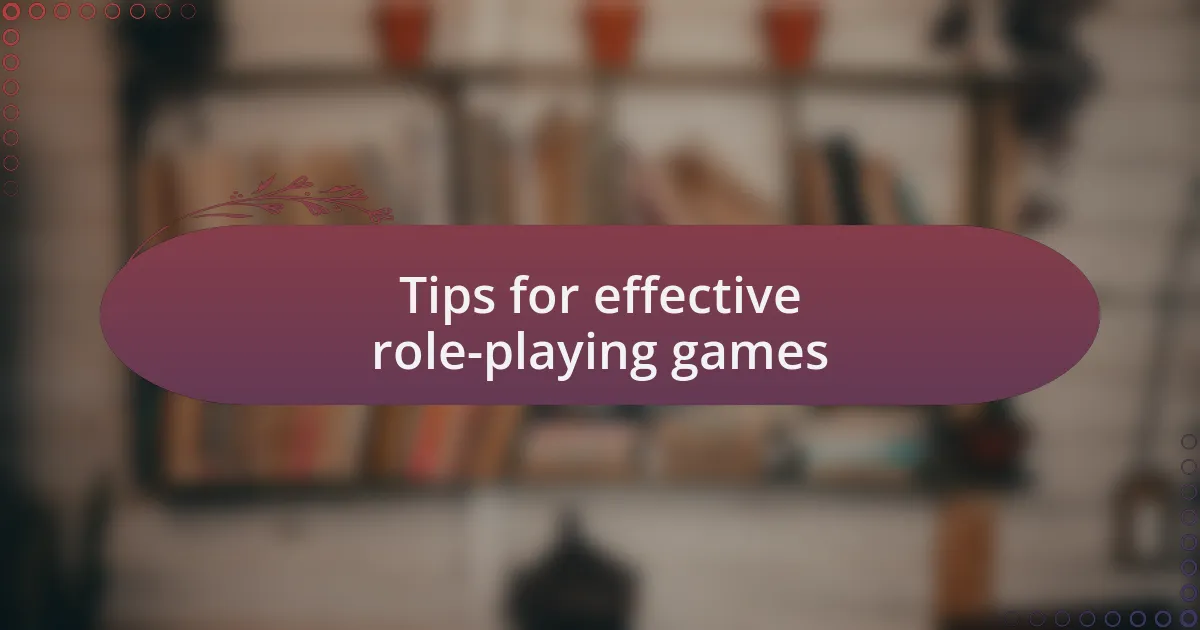
Tips for effective role-playing games
One effective tip I found for role-playing games is to set clear expectations from the outset. I remember a time when I introduced a role-play scenario without explaining the objectives thoroughly, leading to confusion and disengagement among students. By outlining the goals and the structure, I noticed students felt more comfortable diving into their roles, allowing for a more immersive experience. Have you thought about how clarity can shape student involvement?
Another strategy that has proven invaluable is the use of debrief sessions following the role-play. After a particularly intense game about historical events, we gathered to discuss everyone’s experiences and feelings. This reflection not only reinforced learning but also helped students connect emotionally with the content. Have you noticed how powerful it is when students relate personal insights to academic subjects?
Lastly, tailoring the roles to match students’ strengths and interests can significantly enhance engagement. In one instance, I paired a shy student with a confident one, fostering a dynamic partnership that brought out the best in both. This strategy not only enriched the role-play but also built their confidence. It begs the question: how can we better understand our students’ unique attributes to optimize their participation in such creative activities?